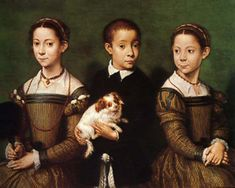Brotherly bonds
by Mila Prol
Sofonisba Anguissola - "Three children with dog" (1570)
In this novel, Maggie O'Farrell depicts, masterfully and delicately,true fraternal relationships between siblings that go beyond life. As Agnes and Bartholomeu grow up in a hostile environment, she has the urge to protect him from his stepmother.
“She grows up knowing that she must protect and defend Bartholomew from all of life’s blows, because no one else will.”
Equally, when she falls in love with that “useless and beardless lad,” according to her stepmother, Bartholomew corresponds to her tenderness by being watchful of her future well-being:
“Take good care of her, Latin boy, very good care, and no harm will come to you.”
Correspondingly, he will abandon his farm and family duties to accompany his sister on her trip to London, where uncertainty awaits her.
Similarly, when a young Hamnet is desperately in search of an adult to aid his ill twin sister, Judith, as death looms imminently, he doesn’t doubt to give his life for hers, in an act of true love and sacrifice.
“It will be easy for Death to make a mistake, to take him in her place.”
As a result of this tragedy, the feeling of being incomplete will invade Judith’s life.
“What is the word, Judith asks her mother, for someone who was a twin but is no longer a twin?”
Bartholomew and Hamnet are the omniscient protectors of their sisters, always there, if needed, always in their memory.




ReplyDeleteThanks a lot Mila! You bring forward a wise selection of quotes, and wonderful paralellisms between the fraternal relationships that pervade the novel. I especially liked your quote about Judith’s sense of loss: she is unable to find a word that may define her, reflecting the impossibility to articulate the magnitude of such grief and bereavement.The equation between Agnes and Bartholomew, and the twins throws new light and fresh thoughts in this novel of endless and intricate possibilities::) Well done!
💗💗💗.Whereas there are cracks in her marriage, Her relationship with her brother is perfect. Both are supportive figures and trust each other completely.And true , there are no words which describe the deep emotional distress caused by the loss of a child or a twin flame....
ReplyDeleteWonderful Mila
ReplyDeleteIt is curious that there is no word (at least in English, Spanish, French or Galician) to describe the loss of a child or a twin brother or sister. Being an orphan is something that is, after all, normal or natural, whereas such a loss would deserve a new word to be coined
(Out of context)
Reading the story of the flea’s travel and how it is described, It reminded me Jorge Drexler's song "Todo se transforma"
I could not help but recall the rythm and the path:
“Tu beso se hizo calor
Luego el calor movimiento
Luego gota de sudor
Que se hizo vapor, luego viento
Que en un rincón de la rioja
Movió el aspa de un molino
Mientras se pisaba el vino
Que bebió tu boca roja
Tu boca roja en la mía (…)
El vino que pagué yo
Con aquel euro italiano
Que había estado en un vagón
Antes de estar en mi mano
Y antes de eso en Torino
Y antes de Torino en Prato
Donde hicieron mi zapato
Sobre el que caería el vino
Zapato que en unas horas
Buscaré bajo tu cama (…)”
Wonderful❤️❤️❤️
ReplyDelete